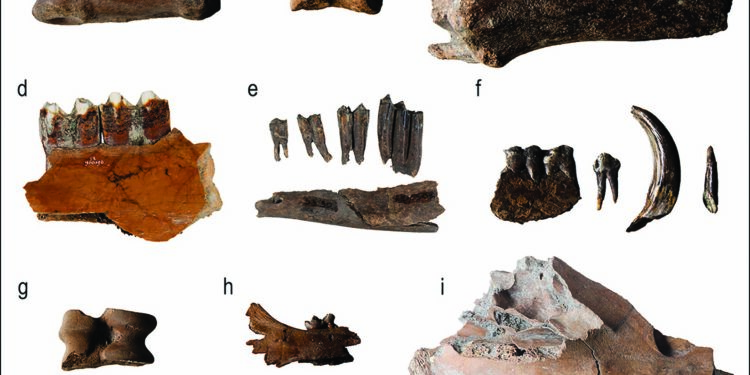This article has been reviewed according to Science X’s editorial process
and policies.
Editors have highlighted the following attributes while ensuring the content’s credibility:
fact-checked
peer-reviewed publication
trusted source
proofread
Ok!
A selection of bones from cattle (a-d), sheep (e), and pigs (f-i) that were analyzed in the study. It was possible to reconstruct the diet of the animals these bones belonged to using stable isotope analysis. For example, cattle (c) spent its life grazing in the forest while cattle (d) fed on manured pasture or salt marshes. Pig (f) likely foraged in the settlement, feeding on cooking waste people left behind. Credit: University of Groningen/EDAN project
× close
A selection of bones from cattle (a-d), sheep (e), and pigs (f-i) that were analyzed in the study. It was possible to reconstruct the diet of the animals these bones belonged to using stable isotope analysis. For example, cattle (c) spent its life grazing in the forest while cattle (d) fed on manured pasture or salt marshes. Pig (f) likely foraged in the settlement, feeding on cooking waste people left behind. Credit: University of Groningen/EDAN project
Archaeologists have discovered evidence for the earliest cattle herds in northern Europe, at the site of Swifterbant in the Netherlands. Using a combination of zoological, botanical, and biochemical methods, they investigated the emergence of farming in northern Europe and found that, not only are these the earliest known domestic cattle, they were also managed in very specific ways.
Agriculture spread through central Europe around 7,000 years ago with the migration of the people of the Linear Pottery culture. North of this region, however, the indigenous inhabitants of what are now the Netherlands, northern Germany, Scandinavia, and Britain continued to live as hunter-gatherers; how and when they adopted farming remains a matter of much debate.
The timing and character of the start of animal husbandry in the Dutch part of this region was studied in a project based at the University of Groningen. The results are published in the journal Antiquity.
“Until now, the earliest clear evidence placed it around 4000 BC. Older dates were contentious,” says lead author of the publication, Dr. Nathalie Brusgaard, now at Leiden University. “In particular, the question of when animals went from being hunted to being kept as livestock remained difficult to pinpoint.”
“We discovered that by 4240 BC, the relationship between humans, animals, and plants had clearly changed. Cattle, sheep, and pigs were by then being kept alongside crop farming,” states Dr. Brusgaard. “What is more, these early farmers had different herds of cattle that were fed and herded in different ways.”
Credit: Antiquity (2024). DOI: 10.15184/aqy.2024.58
× close
Credit: Antiquity (2024). DOI: 10.15184/aqy.2024.58
The researchers uncovered this through stable isotope analysis, a biochemical method that gives insight into the diet of ancient individuals. By looking at the diet of the cattle, they found that these animals could be separated into two different groups based on what they ate. One herd had grazed in forests, while the other had been pastured either on manured fields or in the salt marshes.
This also challenges how we view early farmers.
“These results tell us that not only were there already farmers in this region as early as 4240 BC, they were managing their livestock in complex ways, either using distinctive grazing strategies or acquiring certain stock from elsewhere,” says Dr. Brusgaard. “These early farmers were incredibly knowledgeable about how to manage livestock in this dynamic environment.”
More information:
Nathalie Ø. Brusgaard et al, Early animal management in northern Europe: multi-proxy evidence from Swifterbant, the Netherlands, Antiquity (2024). DOI: 10.15184/aqy.2024.58
Journal information:
Antiquity
Source link : https://phys.org/news/2024-06-earliest-cattle-herds-northern-europe.amp
Author :
Publish date : 2024-06-04 17:13:02
Copyright for syndicated content belongs to the linked Source.



